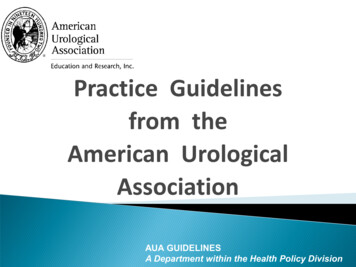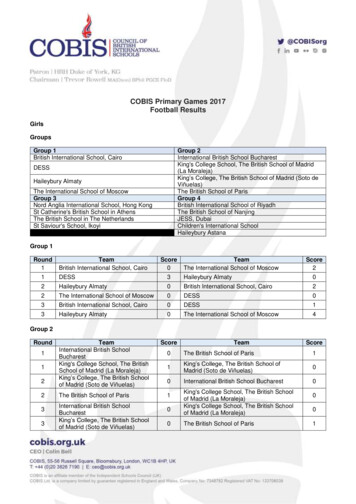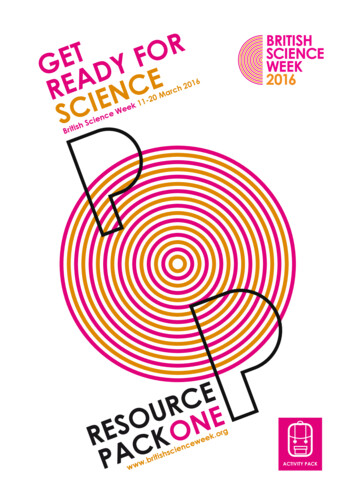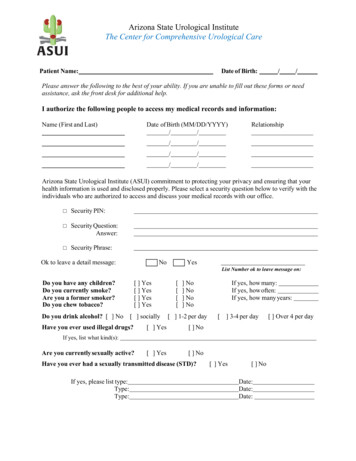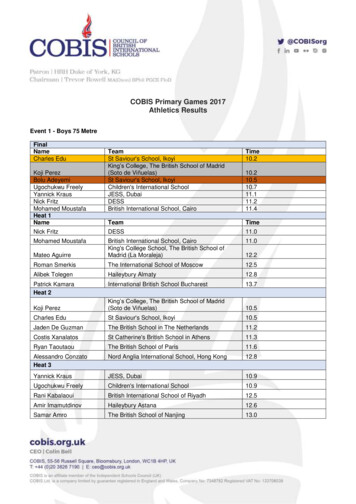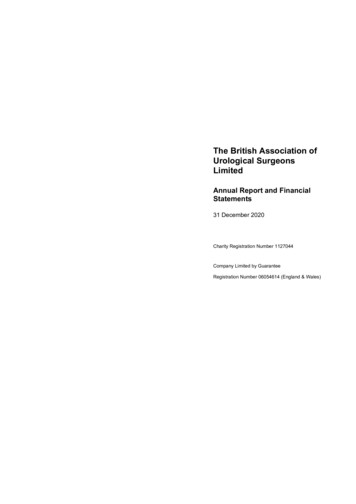
Transcription
The British Association ofUrological SurgeonsLimitedAnnual Report and FinancialStatements31 December 2020Charity Registration Number 1127044Company Limited by GuaranteeRegistration Number 06054614 (England & Wales)
ContentsReportsReference and administrative details of theSociety, its trustees and advisers1Trustees’ reportIndependent auditor’s report223Financial statementsStatement of financial activities28Balance sheet29Statement of cash flows30Principal accounting policies31Notes to the financial statements36The British Association of Urological Surgeons Limited
Reference and administrative details of the Society, its trustees and advisersPresidentVice PresidentHonorary TreasurerHonorary Treasurer ElectHonorary SecretaryHonorary Secretary ElectCo-opted TrusteesRegistered/Principal officeCharity registration numberCompany registration numberAuditorBankersInvestment managersT O’Brien (From 26 June 2020)D Summerton (Until 26 June 2020)J Cresswell (From 26 June 2020)O WisemanN WatkinA MuneerI PearceS Agrawal (Until 31 December 2020)D Thomas (Until 31 December 2020)M BrownG Singh (From 1 January 2021)S F Willis (From 1 January 2021)L Dodgshon (From 25 January 2021)The Royal College of Surgeons England35- 43 Lincolns Inn FieldsLondonWC2A 3PE112704406054614Buzzacott LLP130 Wood StreetLondonEC2V 6DLNational Westminster Bank PlcCorporate Central Banking5 -10 Great Tower StreetLondonEC3P 3HXCCLA Investment Management LimitedSenator House85 Queen StreetLondonEC4V 4ETThe British Association of Urological Surgeons Limited1
Trustees’ report 31 December 2020The Trustees, who are also the directors of the charitable company for the purposes ofcompany law, are pleased to present their annual report with the financial statements of TheBritish Association of Urological Surgeons Limited (BAUS or The Association) for the yearended 31 December 2020.This report has been prepared in accordance with Part 8 of the Charities Act 2011 andconstitutes a directors’ report for the purposes of company legislation.The financial statements have been prepared in accordance with the accounting policies setout therein and comply with the charitable company’s Memorandum and Articles ofAssociation, applicable laws, Companies Act 2006 and Accounting and Reporting byCharities: Statement of Recommended Practice applicable to charities preparing theiraccounts in accordance with the Financial Reporting Standard applicable in the UnitedKingdom and Republic of Ireland (FRS 102) second edition, effective from accountingperiods commencing 1 January 2020 or later.Objectives and activitiesCharitable objectivesThe charitable objective for which the charity was established is:To promote the highest standard in the practice of urology for the benefit of patients byfostering education, research and clinical excellence.Urology deals with specific diseases and disorders of the male genitourinary and femaleurinary tract and urologists are medical and surgical specialists who treat men, women andchildren with kidney, bladder, prostate and urinary problems, covering benign and malignantdisease. Urologists also care for men’s sexual and reproductive health.In order to meet the charitable objective, the Trustees of the Association have set an overallgoal for BAUS to do everything in its powers to support education, research and clinicalexcellence in urology. In pursuance of this overall goal, the principal activity of the charity isthe dissemination of information as it relates to the specialty.In practice, the Association promotes and arranges scientific meetings covering everyaspect of the practice of urology. These include an Annual Scientific Meeting and variousother meetings organised by the sub-specialty sections. The Association supports theeducation of urologists through activities co-ordinated through the Education Committee.The charity also produces patient information leaflets relating to urological conditions andoperations and publishes unit and individual surgeon outcomes for a number of surgicalprocedures. Both activities are intended to provide patients with accurate information abouttheir condition and treatment options and outcomes.The British Association of Urological Surgeons Limited2
Trustees’ report 31 December 2020Objectives and activities (continued)Charitable objectives (continued)The Association’s primary objectives in 2020 were to: Review the current strategic plan in order to inform the development of the nextiteration of the plan from 2021. Build on the income review to explore ways of diversifying income streams and expandpartnership working. Finalise the governance update so that membership of BAUS can be extended to allthose in the urological team and there is potential to appoint non-medically qualifiedtrustees. Consider a new model for Council meetings. Use the enhancements made to the CRM in 2019 to improve the collection andeffective utilisation of workforce data to strengthen BAUS’ position as the leadingurological body in the UK. Review and update ‘A Guide to Job Planning for Consultant Urologists’ (published in2016). Job planning is crucial to enable consultants to fulfil their roles successfully andsupport the delivery of high-quality safe patient care. Update the patient information leaflets on the BAUS website. Review usage of the BAUS website to inform future enhancements as the website isthe key tool in the dissemination of information about the specialty; which is at the coreof the Association’s activities. Continue to embed the newly formed Section of Trainees in BAUS and hold the firstBSoT conference. Mark 100 years of urological excellence in the UK, including the 75th anniversary ofBAUS, with a number of events in 2020 including at the national meeting inBirmingham which will celebrate the past and look to the future.Inevitably these were impacted by the COVID-19 pandemic and a number of activities hadto be re-prioritised in particular the development of the new strategic plan.Public benefitThe Trustees have taken the Charity Commission’s general guidance on public benefit intoconsideration in preparing their statements on public benefit contained within this Trustees’Report.The British Association of Urological Surgeons Limited3
Trustees’ report 31 December 2020Objectives and activities (continued)Public benefit (continued)Benefits and beneficiariesAs stated above, in accordance with its charitable objectives, the Association strives tosupport education, research and clinical excellence in the specialty of urology. In so doing itseeks to improve the quality of medical care for the benefit of patients. The charity’s ultimatebeneficiaries are therefore patients, and benefits to patients are provided through advancingknowledge of, practice in and setting standards for the specialty.Urologists treat a broad spectrum of conditions across all age groups but, particularly withan ageing population, demand for care has been steadily increasing. Urologists and theirteams treat three of the ten commonest cancers, prostate, kidney and bladder, as well as awide range of benign conditions such as lower urinary tract symptoms (which affects 3540% of men over 55 years of age), urinary tract stones and incontinence. The COVID-19pandemic presented particular challenges for BAUS and the wider urological workforce.BAUS embraced new ways of working so that it could continue to provide appropriateprofessional and educational support to urologists to ensure they are able to deliver thehighest standard of care to their patients.Achievements and performanceIn 2020 the Association was only able to run two face to face events but the organisationembraced remote working and online delivery of services and BAUS maintained its role asthe key provider of education and professional development for all doctors working in thefield of urological surgery.Association membership in 2020 was 2,109 (2,042 in 2019). At the present time, 85%(1,005 out of 1,188) of the substantive consultant urologists in the British Isles are BAUSmembers.Events and activitiesAnnual Scientific MeetingThe Annual Scientific Meeting is the biggest event BAUS organises. When the firstlockdown occurred in March 2020 the event was moved from June to November and wasplanned to be a hybrid event, when it became clear that would not be possible it became anonline event. BAUS worked with Launch Interactions to develop an interactive onlineplatform. Whilst a number of sessions were pre-recorded they were broadcast with thefacility for live interaction including chats (approximately 10k) and live polling. There wereindustry sponsored sessions and a virtual exhibition and industry partners gave positivefeedback.Given the uncertainty as to how a virtual meeting would run the Trustees took the decisionto offer the meeting free to all delegates. In total 1,811 delegates registered for the meetingand during the three days of the meeting there were 1,638 active participants. All registereddelegates can access the recorded meeting for up to twelve months post meeting.The British Association of Urological Surgeons Limited4
Trustees’ report 31 December 2020Achievements and performance (continued)Events and activities (continued)Annual Scientific Meeting (continued)In 2020, 621 abstracts were submitted for consideration for inclusion in the Annual ScientificMeeting (581 in 2019), of which 174 were accepted (28%).Four online teaching courses were offered with a total of 685 views, ranging from 129-249.In 2019 265 delegates had attended teaching courses.All delegates were sent an online review form after the meeting and 473 or 29% of activeparticipants (372/41% in 2019) returned comments.Excellent format- all things considered with Covid this is an amazing meetingFirst time in my Urological career only this year I have managed to attend EAU, SIU andBAUS conferences without any doubt I rank BAUS 2020 to be the best out of all. Wonderfulexperience.Having participated in a lot of virtual meetings I must say this was easily the best.The new platform was excellent. Obviously hoping to return to F2F soon but the option towatch again and the round up of posters was really excellent. The platform was very easy tonavigate and everyone should be commended. Thank you.Fantastic meeting organisation and excellent virtual platform. Should definitely be part offuture meetings even after covid 19 pandemic in a (hybrid) format - Definitely keep the ‘viewsessions again’ section.Virtual Platform will need to stay even when then physical meeting can be operated likebefore.Normally pharmaceutical and medical equipment companies attend the Medical and TradeExhibition which runs in parallel with the Annual Scientific Meeting. Inevitably a differentrange of sponsorship opportunities had to be offered for the virtual meeting and required acertain leap of faith on the part of the sponsors. Three companies took sponsorshippackages and a further 12 companies took stands in the virtual exhibition. BAUS isparticularly grateful to all the companies who maintained support.Other meetings and coursesThe Core Urology course was one of only two face to face events BAUS could run in 2020as it runs in January. The course is run annually and is targeted at surgical trainees whohave just started, or are thinking about pursuing, higher specialist training in urology. Thecourse was held at College Court in Leicester in January 2020 and attracted 61 delegates(60 in 2019).The British Association of Urological Surgeons Limited5
Trustees’ report 31 December 2020Achievements and performance (continued)Events and activities (continued)Other meetings and courses (continued)In February the first meeting of the BAUS Section of Trainees (BSoT) was held at LeedsCollege of Music attended by 90 delegates. A post meeting survey, completed by 48 of theattendees, was reviewed by the BSoT executive. The general consensus was that, whilst itwas important to continue to include training issues in the BAUS Annual meeting, thissmaller meeting was more conducive to trainee engagement and provided an importantopportunity for trainees to get together and share ideas more collaboratively. It was agreedthe BSoT meeting would be held biannually so that all specialty trainees had a chance toengage with BSoT relatively early in their training.The FRCS Urology examination is run by the Surgical Royal Colleges and success is amandatory requirement for completion of specialist training which ultimately leads to entryon the GMC’s Specialist Register, a requirement for appointment as a consultant. Theexamination is held twice each year and the BAUS FRCS (Urol) Revision Courses are held4-6 weeks before each sitting. The March revision course was cancelled and all delegatesrefunded. To support the trainees preparing for the exam a series of webinars and vivapractice sessions were organised at short notice by Mr Hari Ratan, the Education Lead forspecialty trainees. 22 webinars were delivered between April and August. Using theexperience gained a more formal series of webinars to support Specialty Trainees waslaunched in September. The first two webinars in this series were delivered in Septemberand October and the programme will extend throughout 2021. The second revision coursewas run as a virtual course from 28 September – 1 October for 66 participants (46 and 48 inMarch and September 2019). Given the nature of this course, with small group viva practiceand high faculty to delegate ratios, it was challenging to accommodate so many trainees butevery effort was made to support those preparing for the only sitting of the exam which waspossible in 2020.In addition to the webinar series for Specialty Trainees referred to above, three more webseries were launched in September 2020. The core trainees series is supplemental to theJanuary course, two webinars were delivered in September and December. TheControversies in Urology series is targeted at consultants and senior trainees, monthlywebinars were delivered between September and December featuring national andinternational experts on the relevant topics. Finally the Innovations in Urology series issponsored by industry partners and three webinars were run in November and December.The Oncology and Endourology meetings were cancelled in 2020.As regional training programmes and face to face meetings and conferences wereadversely impacted by the pandemic urologists have appreciated the extensive range ofonline learning opportunities which BAUS has made available to its members and to thewider urological community.The British Association of Urological Surgeons Limited6
Trustees’ report 31 December 2020Achievements and performance (continued)BAUS Audit Steering GroupEstablished in 2018, the Audit Steering Group (ASG) provides strategic leadership acrossall data and audit activity. It had been agreed that the general principles moving forward are: Focused data collection; Eliminating duplication of data entry and burden of data collection on surgeons byusing existing datasets wherever possible; and Development of projects / snapshot audits that are high impact and focus on answeringspecific clinical questions.In 2020 work focused on: Relationship building, networking and partnership working with national programmesfor quality improvement; Getting it Right First Time (GIRFT) and the National ClinicalImprovement Programme (NCIP); Oversight of audit activity across BAUS and support for development of new audits;and Communication with the membership and promotion of audit as a tool for qualityimprovement.In line with the Association’s data & audit strategy, submission of data to the followingprocedure registries ceased with effect from 31 December 2019: Cystectomy Nephrectomy Radical Prostatectomy PCNL Urethroplasty.The Female Stress Incontinence Registry remained open in 2020 to support members’ datacollection until a nationally funded database for implants is developed to meet theCumberlege recommendations. 2020 data submitted to the BAUS Female SUI registry wasnot analysed or published and the registry closed on 31 December 2020. The Associationadvised members of the importance of continuing to collect the outcomes of Female SUIsurgery if they undertake these procedures. A downloadable skeleton spreadsheet of dataitems for Female SUI is provided on the members area of the website to allow full datacapture until the national database is put in place.The most recently analysed data for all six registries (2017—2019) remains available forview on the public area of the BAUS website.The British Association of Urological Surgeons Limited7
Trustees’ report 31 December 2020Achievements and performance (continued)BAUS Audit Steering Group (continued)Contributors were given the option of downloading and retaining their individual data, shouldthey wish to do so, and were advised on the various data governance regulations andrequirements they needed to ensure were in place for local storage of their downloadeddata. BAUS retains anonymised, aggregated data should it be required to inform particularstudies or research.Work to produce summary data from the registries was progressed in 2020 and is nearcompletion. It is envisaged that the papers produced from this data will be published in2021.BAUS Snapshot AuditsThe registries were replaced with focused snapshot audits that address specific clinicalquestions. These audits cover a wider range of urological conditions and provide unit-levelfeedback to support best practice and quality improvement.Bladder Outflow Obstruction (BOO) AuditBOO is one of the commonest conditions treated by urologists and in recent years therehave been a number of new surgical modalities and techniques introduced. This auditoffered the potential to engage with almost all urological units and captured unit-levelbaseline data across the NHS on all men undergoing intervention for BOO duringNovember 2019 to assess compliance with NICE and EAU guidelines and to determinevariations in assessment and treatment, including waiting times and indications for surgery.Data submission was undertaken between 1 March and 31 June 2020 and collected onJotForm. A total of 1,456 cases (median 11) were submitted, of which 1,303 were fromEngland. This represents 80% of the expected total of 1,620 cases according to HospitalEpisode Statistics (HES). Data was submitted from 105 units in the UK; there were 106cases from Scotland, 32 from Wales and 15 from Northern Ireland.Individual unit data for benchmarking quality improvement purposes was sent to allparticipating units in October 2020. The global data was presented at the BAUS 2020Annual Meeting in November 2020 and headline statements from the audit are posted in themembers section of the BAUS website. A paper on the national data is being prepared forpublication in 2021.Renal Colic AuditThis audit launched in November 2020 and is collecting baseline data across the NHS onthe management and assessment of patients presenting with renal colic to enable units toassess their performance against the NICE Quality Standards for stones. The datasubmission period is 1 March to 31 March inclusive, allowing entry of follow-up data, andwill be collected on JotForm. The audit will report in mid-2021.The British Association of Urological Surgeons Limited8
Trustees’ report 31 December 2020Achievements and performance (continued)BAUS Snapshot Audits (continued)Management of the Lower Ureter in NephroureterectomyThis audit launched in August 2020 and will remain open until 31 December 2021, reportingin 2022. The audit aims to determine which surgical technique offers the best oncologicalcontrol in terms of survival and recurrence. Data on nephroureterectomy proceduresperformed between 1 January 2017 and 31 December 2019 was captured on in the BAUSnephrectomy registry and a small number of additional fields have been added to thisdataset, with follow up data also currently being added. By December 2020, consultantswho undertook 2,000 of the 3,000 lower NU procedures in the nephrectomy registry in2017-2019 were signed up to the audit.Cytoreductive Radical Nephrectomy AuditThis prospective audit of a sub-set of procedures submitted to the BAUS nephrectomyregister from 1 January to 31 December 2019 closed on 31 December 2020 with data on257 patients, 140 of which have follow-up. The data from this audit on contemporarymanagement of patients undergoing cytoreductive radical nephrectomy in the UK postCARMENA will be written up in 2021.Emergency Ureteric Injury ManagementThe ASG provided guidance and support for the development of this audit with the Sectionof FNUU. This audit is scheduled to launch in 2022.National Clinical Improvement Programme (NCIP)Throughout 2020 the ASG continued to provide clinical leadership and expertise to NCIP toco-develop the urology procedure dashboards and metrics in the NCIP data portal. It alsofacilitated the clinical input to the GIRFT coding project underpinning this work.In 2020 draft coding guidance was co-developed by GIRFT and BAUS for: PCNL (including other calculus removal) Prostatectomy Urethroplasty Nephrectomy Male Bladder Outflow SurgeryThe final drafts will be sent to the NHSD Terminology and Classifications Service forapproval in 2021.The British Association of Urological Surgeons Limited9
Trustees’ report 31 December 2020Achievements and performance (continued)National Clinical Improvement Programme (NCIP) (continued)By the end of 2020 nine urology units in England had access to the NCIP data portal. Theportal provides access to individual outcomes data and unit-level data and is intended tosupport consultants in England as part of their personal learning and development. Itprovides both local and national benchmarks against which consultants can review andaccess their patient outcomes, with the aim of delivering improved patient care.In 2020 the Association formally supported the NCIP Business Case 2020-24 for full rolloutof the NCIP data portal across all Trusts in England, with urology as the vanguard specialtyfor implementation to support members’ appraisal and revalidation.It is hoped that the learning from the collaboration with NCIP can be applied to any futuredata collection systems developed by the devolved nations.Quarterly newsletters updating members on the latest developments in BAUS data & auditwere sent out in 2020 as well as a series of specific communications regarding the closureof the BAUS registries. The BAUS website was updated at regular intervals throughout theyear.BAUS WebsiteThe BAUS site was launched in June 2015 and the Association has continued to workclosely with its website developer, Lightmedia Communications Limited, and the SurgicalWeb Editor (N Bullock) to maintain and enhance the site.The site gives prominence to the patients’ area, which includes a “Find a Surgeon” sectionwhich allows the public to search for and view member profiles. These, in turn, link to thesurgeon’s outcome data. Usage of the “Find a Surgeon” section has increased to 283,665page views from 210,490 in 2019.In 2020 a total 483,665 (549,090 in 2019) users visited the site of which 99% were newvisitors. In 2020 325,026 visitors, 61% of users, were UK based compared to 67% in 2019.In 2020 223,008 users, 46% of users, accessed the site with a mobile or tablet devicecompared to 58% in 2019.The most popular area of the site is the patients’ area, with 1,079,929 visitors, 62% of thepage views in 2020 (1,052,512 in 2019). 8 of the top 10 landing pages on the site are in thepatient’s area.The surgical outcomes area of the site had 199,901 views (12%) page views, down from210,749 in 2019. Page views in the professionals’ area increased from 234,881 in 2019 to249,367 in 2020.The British Association of Urological Surgeons Limited10
Trustees’ report 31 December 2020Achievements and performance (continued)BAUS Website (continued)Page views for the patient information leaflet area decreased from 158,323 in 2019 to155,530 in 2020, possibly reflecting a decrease in the amount of consultations and electivesurgery being undertaken in 2020. Leaflets on bladder procedures, prostate procedures,and stones were most frequently viewed.Other activitiesWorkforceEarly in 2020 BAUS published a workforce report using the 2019 workforce data. BAUSundertakes an annual workforce survey, using the network of regional representatives, anduses the information to contribute to discussions on workforce planning.Key amongst BAUS’s strategic aims is to raise the profile of the specialty amongst medicalstudents, encourage junior doctors to consider a career in urology and to inspire the nextgeneration of urologists to engage with the Association. To this end BAUS ran an essaycompetition for medical students and an audit competition for Foundation Year and CoreTrainees (FY & CTs). In 2020 104 submissions were received for the essay competition (76in 2019). 21 submissions were received for the audit competition (11 in 2019). Usually thenational winners are invited to attend the Annual Scientific Meeting, in the virtual meetingthe names of the winners were announced and prizes and certificates were sent to theindividuals.BAUS, in collaboration with ITN Productions Industry News, launched an original, newsformat, bespoke co-production that raises awareness and understanding of the role ofurological professionals and explores the pioneering surgical techniques that have takenminimally invasive surgery to new levels within the health sector. This is available on theBAUS website and is being used by the Education Lead for Medical Students and theMedical School champions to promote the specialty to medical students.Standards of CareBetween March and May BAUS published detailed and timely advice for clinicians copingwith the challenges presented by the COVID-19 pandemic.Three documents on the interim management of bladder, kidney and prostate cancer werepublished on 19 March. These were followed by documents on the management of penilecancer, 25 March and testicular cancer, 27 March. All these documents were reviewed andupdated in May.A general advice document, suggesting a triage schema for prioritising urological care, wasalso published in March together with advice on PPE equipment for urologists and guidanceon urological laparoscopy and robotic assisted laparoscopic surgery during the COVID-19pandemic.The British Association of Urological Surgeons Limited11
Trustees’ report 31 December 2020Achievements and performance (continued)Other activities (continued)Standards of Care (continued)All information was uploaded to the BAUS website and emailed to members and a patientinformation page was also created which included a video on how remote consultationswork.In May Guidelines for planning non-emergency operating services in the COVID-19 erawere published and each of the BAUS sections produced guidance on the re-introduction ofurological surgery and activity in their relevant specialty areas.Up to November 2020 the clinicians’ pages on the website had 4,597 views and the patientpages had 7,225 views.The NICE Quality Standard on renal and ureteric stones, to which BAUS had contributed,was published in July. There were no other NICE clinical guidelines of particular relevanceto urology requiring input in 2020 but BAUS continued to assist with numerous NICEtechnology appraisals and evaluations of interventional procedures.As it was not possible to visit regions or hold face to face meetings the BAUS President tooka lead in establishing a series of podcasts to update on plans, projects and activities. Fourpodcasts were produced in 2020. The President also held live Q&A sessions at the AnnualMeeting in June and a 60 minute online session in July.Financial reviewFinancial results of activities and eventsIn general, the Association’s finances are stable although the Trustees are mindful of theneed to diversify sources of income and balance income and expenditure in the long run.In 2020 there was an operating deficit of 26,214 (2019 - 175,718, 2018 - 48,272), againsta budgeted deficit of 175,684.The direct surplus from the 2020 Annual Scientific Meeting (ASM) was 87,957 ( 77,7902019 and 226,012 - 2018). Considering the uncertain circumstances and the decision towaive registration fees for the 2020 meeting the positive outcome is particularly welcome.Expenditure on the virtual meeting was 58,449 (2019 F2F meeting expenditure - 470,883)and the income at 146,406 was also considerably lower ( 548,673 in 2019). At theoutbreak of the COVID-19 pandemic BAUS had significant contractual commitments inrespect of the ASM, BAUS has negotiated for the 2020 contract to roll forward to futureyears.The British Association of Urological Surgeons Limited12
Trustees’ report 31 December 2020Financial review (continued)Financial results of activities and events (continued)Although many of the online educational activities were provided free to members, the lowercosts involved in delivering online events still meant the surplus on educational activitieswas higher than previously, 30,480 in 2020 as opposed to 3,244 in 2019. Theintroduction of industry sponsored webinars also generated new income of 12,600.In 2020 subscriptions generated 533,225 (2019 519,426) which, in the changedcircumstances, amounted to 56% of the Association’s income in 2020 ( 519,426/34% in2019).Reserves policy and financial positionThe “free reserves” of BAUS at 31 December 2020, calculated as the total general funds ofthe Association less the value of tangible fixed assets, amounted to 2,532,925 (2019 2,466,728).Usually the Annual Scientific Meeting generates about 30-40% of BAUS’s income, in 2020 itaccounted for only 15% and BAUS are fortunate that the membership subscriptions providea secure and stable income stream. BAUS has always been aware that it is exposed tosignificant financial risks in organis
relationship with, the Association's investment manager, CCLA. The Association's investment strategy is to seek a long-term total return comprising growth in capital and income with a medium level of investment risk. The Trustees have delegated certain discretionary powers of investment to CCLA but can approve changes to the overall


